Rhodiola Rosea and Mood Resilience Under Stress
Introduction
When stress hits hard, your mind and body can only take so much before exhaustion sets in. Fatigue, irritability, low mood, and lack of focus become constant companions. But what if there was a plant that could help you adapt — not just cope — to life’s stressors?
Meet Rhodiola rosea, the “golden root” 🌸 — a powerful adaptogenic herb that’s been used for centuries in Siberian, Scandinavian, and Tibetan medicine to build endurance, sharpen the mind, and stabilize mood under pressure.
Modern science is now catching up, revealing how Rhodiola enhances stress resilience, supports emotional balance, and even helps prevent burnout.
Let’s dive into how Rhodiola works, what studies show, and how to use it to strengthen both your mind and mood — especially in a world that never seems to slow down.
Looking for supplements for Brain Fog? Click here.
🧠 What Is Rhodiola Rosea?
Rhodiola rosea is a flowering herb native to cold mountainous regions — from Siberia to the Arctic. Its golden root has been used for over 2,000 years to fight fatigue, boost stamina, and maintain mental clarity during physical and emotional stress.
Traditional healers in Russia and Scandinavia called it “the golden energy of the North.” Even Viking warriors reportedly used Rhodiola to improve endurance and resilience in battle ⚔️.
Today, it’s classified as an adaptogen — a rare group of plants that help the body adapt to stress and restore balance to the nervous and endocrine systems.
🌿 How Adaptogens Like Rhodiola Work

Adaptogens don’t block stress — they teach your body how to handle it better.
They support homeostasis, the body’s natural state of equilibrium, by regulating stress hormones like cortisol and adrenaline.
Think of Rhodiola as a personal coach for your stress response — it helps you bounce back faster instead of burning out.
💬 Instead of sedation or stimulation, adaptogens create balance — calm energy without the crash.
⚙️ Rhodiola’s Active Compounds
Rhodiola’s stress-fighting powers come from several bioactive compounds, especially:
Rosavin — balances cortisol levels and supports serotonin.
Salidroside — protects brain cells from oxidative and emotional stress.
Tyrosol — enhances dopamine and mental alertness.
Flavonoids — provide antioxidant protection.
These compounds work synergistically to calm the nervous system, boost energy, and improve overall mood resilience.
💛 Rhodiola and Stress: The Science of Resilience
When stress becomes chronic, cortisol stays elevated, leading to fatigue, brain fog, anxiety, and even depression. Rhodiola helps regulate this response at multiple levels.
🧬 Cortisol Regulation
Rhodiola modulates the hypothalamic-pituitary-adrenal (HPA) axis, the brain’s central stress control system.
A 2009 Phytomedicine study found that Rhodiola extract significantly lowered cortisol levels in people under high stress, improving focus and emotional balance.
💬 Less cortisol = fewer meltdowns and more emotional steadiness.
🌿 Boosting Serotonin and Dopamine
Rhodiola influences key neurotransmitters — serotonin, dopamine, and norepinephrine — that regulate mood, motivation, and pleasure.
A Journal of Ethnopharmacology study showed Rhodiola enhances serotonin activity in the brain’s prefrontal cortex, helping counteract depressive and anxious states.
🧠 It’s like turning the brain’s resilience circuits back on.
⚡ Combating Fatigue and Burnout
Rhodiola’s ability to increase cellular energy (ATP production) helps fight both mental and physical fatigue.
A 2017 Neuropsychiatric Disease and Treatment study found that Rhodiola supplementation reduced symptoms of stress-related burnout — including exhaustion, anxiety, and low motivation — within just one week of use.
🌿 You feel calmer, clearer, and more capable — even under pressure.
🌞 Rhodiola and Mood Disorders
While Rhodiola isn’t a replacement for medical treatment, it shows promise as a natural support for mild-to-moderate depression and anxiety.
🧠 Mild Depression
A 2015 Phytomedicine study compared Rhodiola extract with sertraline (Zoloft) in patients with mild depression. Both groups improved significantly — but Rhodiola caused fewer side effects such as fatigue or sexual dysfunction.
💬 It works more gently, supporting rather than forcing balance.
😌 Anxiety and Emotional Regulation
Rhodiola reduces anxiety by balancing the body’s stress response, particularly during acute pressure or emotional turmoil.
A 2012 Phytotherapy Research study found that Rhodiola supplementation for two weeks significantly reduced anxiety, anger, and confusion in stressed students during exams.
✨ It doesn’t blunt emotion — it helps you stay calm through emotional storms.
Looking for supplements for Brain Fog? Click here.
🩵 Rhodiola for Cognitive and Emotional Performance
When stress levels rise, cognitive performance — memory, attention, decision-making — declines. Rhodiola reverses that downward spiral.
🧩 Sharper Focus and Memory
A 2000 Phytomedicine study on medical students during exams found that Rhodiola improved mental performance, focus, and reaction time under stress.
Participants reported less mental fatigue and improved accuracy in problem-solving tasks.
🌈 Emotional Endurance
By sustaining dopamine and serotonin balance, Rhodiola enhances emotional endurance — the ability to stay optimistic and motivated even when life gets tough.
💬 Resilience isn’t about never feeling stressed — it’s about recovering faster.
⚖️ How Rhodiola Balances Energy and Calm
One of Rhodiola’s most unique features is its dual-action effect:
At low doses → energizing and mood-lifting ☀️
At higher doses → calming and stabilizing 🌙
This makes it ideal for people who experience both stress-related fatigue and anxiety — those “wired but tired” feelings common in modern life.
💬 Real-World Scenario
You’re drained after a long week but your mind won’t stop racing at night. Rhodiola helps you stay alert during the day and relaxed enough to sleep at night — by optimizing your stress response in both directions.
🌿 The Mitochondrial Connection: Cellular Stress Relief
Rhodiola’s salidroside compound protects mitochondria, the energy-producing parts of your cells, from oxidative stress.
This keeps energy steady even during emotional strain, reducing fatigue, brain fog, and mood crashes.
A 2014 Frontiers in Pharmacology review found that Rhodiola helps cells maintain energy balance under physical and psychological stress, contributing to long-term emotional resilience.
🌬️ Pairing Rhodiola with Breathwork and Mindfulness
Breathwork activates the parasympathetic nervous system — the “rest and digest” mode — while Rhodiola strengthens your overall stress tolerance.
Together, they create a complete stress-resilience system: immediate calm (from breath) + long-term adaptability (from Rhodiola).
🌫️ Try This “Resilience Breath”:
Inhale through your nose for 4 seconds.
Hold for 2 seconds.
Exhale slowly for 6 seconds.
Repeat for 3 minutes before stressful events.
💨 Combine this with a morning Rhodiola capsule for balanced energy and emotional composure throughout the day.
Want to try Breathwork? Click Here.
🕰️ Dosage and How to Take Rhodiola
💊 Standardized Extract
Look for Rhodiola rosea extract standardized to 3% rosavins and 1% salidroside — the clinically studied ratio.
| Goal | Dosage | Timing |
|---|---|---|
| General stress support | 200–400 mg/day | Morning |
| Fatigue or burnout | 400–600 mg/day | Morning or early afternoon |
| Mood balance | 300–500 mg/day | Consistent daily use |
💡 Start low and adjust upward. Effects usually appear within 1–2 weeks.
🍽️ Timing Tips
Take on an empty stomach or 30 minutes before breakfast.
Avoid taking late in the day — it can be mildly energizing.
Pair with magnesium or B vitamins for added nervous system support.
⚠️ Safety and Side Effects
Rhodiola is considered safe and well-tolerated, even for long-term use.
Possible mild effects:
Jitteriness (if dose too high)
Insomnia (if taken too late)
Dry mouth or mild headache
⚠️ Not recommended for:
Pregnant or breastfeeding women (due to limited data)
People on SSRIs, SNRIs, or MAOIs — consult a healthcare provider first
💬 Used correctly, Rhodiola enhances mood without overstimulation.
🌿 Synergistic Combinations for Emotional Stability
Rhodiola works best when combined with other mood-balancing nutrients.
| Supplement | Synergy | Effect |
|---|---|---|
| Ashwagandha | Cortisol regulation | Stress reduction and calm |
| L-Theanine | GABA support | Relaxed focus |
| Magnesium Glycinate | Nervous system balance | Fewer anxiety spikes |
| Omega-3s (EPA/DHA) | Neurotransmitter function | Mood stabilization |
| B-Complex Vitamins | Energy metabolism | Reduced fatigue |
💊 Stack example:
Morning → Rhodiola + B-complex
Evening → Magnesium + Omega-3s
🌸 Rhodiola for Women and Hormonal Stress
Hormonal changes can amplify stress sensitivity. Rhodiola helps by stabilizing the HPA axis and supporting serotonin balance, making it beneficial during PMS, perimenopause, or postpartum fatigue.
A 2020 Nutrients study found that women taking Rhodiola experienced improved stress resilience and fewer mood fluctuations, particularly during hormonal transitions.
🌿 It’s an adaptogen for both emotional and hormonal balance.
🌞 Rhodiola for Energy, Confidence, and Motivation
Rhodiola’s dopamine-enhancing action helps restore motivation, confidence, and drive, especially when stress leads to emotional flatness or apathy.
💬 Many users report feeling “lighter and more capable” — a steady mental uplift without caffeine jitters or crashes.
🧠 Rhodiola helps you handle life without losing your spark.
Looking for online therapy ? Click Here.
🌈 Real-Life Story
Case Example:
Leo, a 35-year-old entrepreneur, faced burnout — waking up tired, feeling anxious, and losing motivation for work.
His naturopath recommended 300 mg Rhodiola each morning, paired with breathwork and evening magnesium.
After three weeks, Leo noticed:
Greater energy without caffeine ☀️
Fewer mood swings 🌿
More focus under pressure 💬
💬 “It didn’t make me superhuman — it made me feel human again.”
🧘 Building Mood Resilience: Beyond Supplements
Rhodiola works best as part of a broader self-regulation strategy:
💪 Lifestyle Tips
Exercise regularly (boosts serotonin and dopamine)
Eat balanced meals with complex carbs and protein
Sleep 7–9 hours to reset cortisol
Practice mindfulness or breathwork daily
🌿 Resilience is built by consistency — Rhodiola simply accelerates the process.
⚖️ Key Takeaways
✅ Rhodiola is a proven adaptogen for managing stress and fatigue.
✅ It balances cortisol, serotonin, and dopamine — the key mood pathways.
✅ Enhances emotional resilience, focus, and motivation.
✅ Works gently without overstimulation or dependency.
✅ Ideal for burnout recovery, anxiety, and low mood under chronic stress.
💬 Think of Rhodiola as a nervous system ally — helping you stay strong, steady, and centered, no matter what life brings.
📚 References
Darbinyan, V., et al. (2000). “Rhodiola rosea in stress-induced fatigue.” Phytomedicine, 7(5), 365–371.
Panossian, A., et al. (2009). “Adaptogens in stress-induced and stress-preventive therapy.” Phytomedicine, 16(6-7), 481–493.
Mao, J. J., et al. (2015). “Rhodiola rosea versus sertraline for mild to moderate depression.” Phytomedicine, 22(3), 394–399.
Olsson, E. M. G., et al. (2009). “Effects of Rhodiola rosea on mental performance under stress.” Phytomedicine, 16(5), 356–362.
Panossian, A., & Wikman, G. (2010). “Pharmacology of adaptogens.” Phytomedicine, 17(7), 481–493.
Spasov, A. A., et al. (2000). “Effects of Rhodiola rosea extract on the fatigue of students.” Phytomedicine, 7(2), 85–89.
Sarris, J., et al. (2020). “Herbal adaptogens and stress resilience.” Nutrients, 12(7), 2153.
Related Posts
-

Nootropics That Promote Calm and Rest
Explore the world of calming nootropics — natural brain enhancers that promote relaxation, better focus, and deeper rest. Learn how L-Theanine, magnesium, ashwagandha, and other adaptogens help balance your nervous system, reduce stress, and support restorative sleep.
-

Best Natural Supplement Stack for Sleep
Discover the best natural supplement stack for deep, restorative sleep. Learn how nutrients like magnesium, L-theanine, glycine, and calming herbs such as chamomile and ashwagandha work together to relax your body, calm your mind, and improve sleep quality—naturally and safely.
-

Combining L-Theanine and Magnesium for Sleep: A Calm Night, Naturally
Discover how combining L-Theanine and Magnesium can help you drift into deep, restorative sleep. Learn how this natural duo calms the mind, relaxes the body, and supports your nervous system—without grogginess the next morning.
-

How to Sleep Better After Intense Workouts
Struggling to fall asleep after a tough workout? Learn how to optimize your post-training recovery with nutrition, hydration, and science-backed sleep strategies. Discover how to calm your nervous system, balance hormones, and wake up fully recharged for your next session.
-

Ashwagandha and Valerian: A Bedtime Combo for Deep Rest and Emotional Reset
Discover the calming synergy of Ashwagandha and Valerian root, two natural sleep aids that help quiet the mind, ease anxiety, and promote deeper rest. Learn how this herbal duo supports the nervous system, balances stress hormones, and restores emotional peace — without next-day grogginess.
-

How to Create a Resilience-Boosting Diet
Discover how to build emotional and physical strength from the inside out with a resilience-boosting diet 🍎. Learn which foods stabilize your mood, how supplements like magnesium and omega-3s strengthen your stress response, and why pairing nutrition with breathwork and therapy creates lasting calm, focus, and vitality 🌿💪.
-

Best Teas and Herbal Blends for Calmness: Nature’s Way to Restore Inner Peace
Ashwagandha, the ancient adaptogenic herb, helps your body find balance during stress. Known as “Indian ginseng,” it supports cortisol regulation, boosts energy, and restores calm clarity. Discover how this powerful root promotes resilience, emotional balance, and steady vitality — one cup at a time. 🌸
-

Parenting and Emotional Strength: How to Raise Children Without Losing Yourself
Empathy is the bridge that connects hearts — the quiet power to understand, feel, and support another’s emotions without judgment. Learn how empathy strengthens relationships, enhances communication, and cultivates deeper compassion in everyday life. 🌿
-

How to Bounce Back from Public Failure: Reclaiming Confidence, Purpose, and Power
Visualization is more than imagination — it’s brain training for resilience. By picturing calm, success, or healing, you activate the same neural pathways as real experience. Learn how daily visualization rewires your brain for confidence, emotional balance, and recovery from stress. ✨
-

Coping with Financial Stress Through Resilience: How to Stay Grounded When Money Feels Tight
Body awareness is the foundation of emotional resilience. By tuning into your body’s signals — tension, fatigue, or calm — you learn to recognize stress before it overwhelms you. Discover how mindfulness, gentle movement, and breathwork can deepen your connection with your body and restore balance from the inside out. 🧘
-

How to Stay Positive During Chronic Illness: A Guide to Emotional Strength and Hope
Creativity is more than art — it’s a form of healing. Whether through painting, writing, music, or small acts of expression, creativity helps release emotion, calm the nervous system, and reconnect you to joy. Discover how to use creativity as a tool for emotional balance, resilience, and self-discovery. 🌿
-

Resilience Tips for Caregivers: How to Stay Strong While Caring for Others
Joy isn’t the absence of pain — it’s the quiet strength to find light even in challenging times. Cultivating joy through small daily moments restores balance, releases stress, and reminds you of life’s beauty. Learn how to reconnect with authentic happiness, rebuild emotional energy, and nurture your nervous system through gratitude, presence, and play. 🌿
-

Building Resilience After a Breakup: How to Heal, Rebuild, and Rise Stronger
Social connection is one of the strongest predictors of emotional resilience. During difficult times, genuine relationships act as anchors — calming the nervous system, reducing stress hormones, and helping you regain perspective. Learn how cultivating real human connection can strengthen your mind, heart, and overall well-being. 🌿
-

How to Stay Emotionally Strong During Job Loss
Your emotions are powered by brain chemistry — a delicate balance of neurotransmitters like serotonin, dopamine, and cortisol. When these chemicals work in harmony, you feel calm, focused, and resilient. Learn how daily habits, nutrition, and mindfulness can support your brain chemistry and boost emotional well-being naturally. 🌿
-

The Role of Hormones in Emotional Stability: How Your Chemistry Shapes Your Calm
Hormones shape more than your body — they shape your emotions, resilience, and sense of calm. From cortisol to serotonin, these chemical messengers influence how you react to stress, connect with others, and recover from challenges. Learn how to balance your hormones naturally to build lasting emotional stability and harmony within. 💫
-

Mitochondria and Emotional Energy: The Cellular Power Behind Your Mood
Breathwork is one of the most powerful tools for emotional regulation and cellular balance. Through intentional breathing, you can calm your nervous system, increase oxygen flow to the brain, and even support mitochondrial energy. Learn how conscious breathing connects body and mind — transforming stress into presence and emotional strength. 🌿
-

Inflammation and Its Impact on Mood Resilience: The Silent Link Between Body and Mind
Inflammation doesn’t just affect the body — it impacts the mind. Chronic inflammation alters brain chemistry, depletes serotonin, and makes emotional recovery harder. Learn how calming inflammation through nutrition, mindfulness, and sleep can restore balance, resilience, and a renewed sense of emotional strength. 💫
-

How Antioxidants Protect Emotional Well-being: The Hidden Link Between Oxidative Stress and Mental Health
Antioxidants do more than protect your body — they defend your mind. By neutralizing oxidative stress, antioxidants support serotonin, dopamine, and brain energy pathways that keep you calm, focused, and emotionally balanced. Discover how foods like berries, green tea, and dark chocolate nourish your brain, boost mood, and strengthen resilience from the inside out. 🌿✨
-

The HPA Axis and Emotional Health: The Hidden Bridge Between Stress and Mind
Neuroplasticity — the brain’s ability to rewire and adapt — is the foundation of emotional healing and resilience. When you face stress, trauma, or change, your neural pathways can reshape themselves to support new patterns of calm, focus, and self-awareness. Learn how daily practices like mindfulness, therapy, and breathwork strengthen neuroplasticity to transform emotional pain into personal growth. 🌸
-

Why Cortisol Control Is Key to Resilience: Mastering Stress to Build Emotional Strength
Controlling cortisol — the body’s main stress hormone — is the secret to lasting resilience. When cortisol levels stay balanced, your mind becomes clearer, emotions steadier, and energy more sustainable. Learn how breathwork, mindset shifts, adaptogens, and daily rhythms can help you calm your stress response and build true inner strength. 🌞💪
-

Dopamine’s Influence on Motivation and Recovery: Reigniting Drive and Balance
Healthy relationships are the foundation of emotional balance and resilience. Whether romantic, familial, or platonic, genuine connection releases dopamine, serotonin, and oxytocin — the brain’s “bonding trio” — helping us feel secure, motivated, and seen. Learn how trust, empathy, and communication not only strengthen your connections but also reshape your nervous system for deeper emotional well-being. 🌿🤝
-

The Role of Serotonin in Resilience: How This “Mood Molecule” Shapes Emotional Strength
Serotonin — often called the “resilience molecule” — plays a vital role in how we handle stress, regulate mood, and recover from emotional challenges. Beyond happiness, this powerful neurotransmitter helps balance the gut-brain axis, stabilize the nervous system, and support emotional flexibility. Learn how nutrition, sunlight, mindfulness, and adaptogens can naturally boost serotonin and strengthen your emotional resilience. 🌞🧠
-

How Neuroplasticity Supports Emotional Growth: Rewiring the Brain for Resilience
Neuroplasticity is the brain’s built-in power to grow, adapt, and heal — and it’s the foundation of emotional transformation. Every mindful breath, compassionate act, or reframed thought strengthens new neural pathways that support resilience and self-awareness. Learn how your brain rewires through daily habits, helping you turn emotional challenges into opportunities for growth and calm. 🌿
-

Tai Chi and Adaptogens for Mind-Body Balance: The Art of Harmonizing Energy and Resilience
Alchemy isn’t just an ancient science — it’s a timeless symbol of transformation and inner balance. By blending the physical and spiritual, alchemy teaches us that change begins from within. Just as metals are refined into gold, we too can transmute emotional pain, stress, and chaos into clarity and strength through mindful practice and self-awareness. 🌙✨
-

Cold Therapy and Emotional Control: Training the Mind Through the Body
Cold therapy isn’t just for athletes — it’s a tool for emotional mastery. By exposing your body to controlled cold, you train your nervous system to stay calm under stress, improving focus, mood, and resilience. This article explores the science of cold exposure, its impact on hormones and the vagus nerve, and how ice baths and cold showers can help you build emotional control, one breath at a time. 🧊🧘♂️
-

How Music Influences Emotional Recovery: The Healing Soundtrack of the Mind
Neuroplasticity — the brain’s ability to rewire and heal itself — is at the heart of emotional recovery. Through mindful habits, music, therapy, and consistent mental stimulation, your brain can form new connections that support resilience and well-being. Discover how neuroplasticity turns pain into growth, helping you rebuild balance, focus, and emotional strength. 🌿
-

Nature Therapy for Building Resilience: Reconnecting With the Healing Power of the Earth
Nature therapy helps rebuild emotional resilience by reconnecting you with the healing rhythms of the Earth. From forest walks to sunlight exposure, nature restores balance to your nervous system, lowers stress hormones, and teaches emotional adaptability. Learn how spending time outdoors can enhance mental clarity, calm anxiety, and awaken your natural capacity to heal. 🌞
-

Breathwork Techniques That Pair with Supplements: The Ultimate Synergy for Stress Relief and Mental Clarity
Breathwork and supplements create a powerful mind-body synergy for stress relief, focus, and energy. By combining intentional breathing with adaptogens, nootropics, and calming nutrients, you can naturally regulate cortisol, sharpen mental clarity, and boost emotional balance. This guide explores the best breathwork techniques and supplement pairings to help you feel centered, calm, and energized from the inside out. 🌿
-

Why Cortisol Balance Matters for Emotional Strength
Balancing cortisol — your body’s main stress hormone — is essential for emotional resilience. When cortisol is chronically high, your mind stays stuck in survival mode, leading to fatigue, anxiety, and emotional instability. This article explores how nutrition, supplements, breathwork, and therapy can help restore healthy cortisol rhythms, regulate the nervous system, and strengthen your ability to handle life’s challenges with calm focus and emotional strength. 🌿
-

Best Supplements for Students During Exam Season: Focus, Energy, and Memory Support
Studying late into the night? Learn which natural supplements can boost focus, memory, and mental stamina during exam season — without the crash. From omega-3s to Bacopa and Rhodiola, discover your brain’s ultimate exam support stack. 🎓🧠
-

Natural Memory Boosters for Seniors: How to Keep Your Mind Sharp and Focused
Stay mentally sharp and confident as you age. Discover science-backed natural supplements and lifestyle habits that boost memory, focus, and brain longevity for seniors. 🌿🧠
-

The Link Between Stress, Cortisol, and Memory Loss
Chronic stress can quietly erode your memory — and cortisol is the key culprit. Learn how stress hormones affect the brain, why the hippocampus shrinks under pressure, and how natural strategies can help you restore memory and mental clarity. 🧠✨
-

How to Build a Daily Supplement Routine for Memory Health
Want to sharpen your memory and stay mentally clear? Learn how to build a daily supplement routine for memory health — from morning focus to nighttime brain repair. Discover science-backed nutrients that boost recall, focus, and long-term cognitive resilience. 🧠🌿
-

Top 5 Natural Supplements for Memory Recall and Focus
Looking to boost memory and concentration naturally? Discover the top 5 supplements — Bacopa, Ginkgo Biloba, Lion’s Mane, Rhodiola, and Phosphatidylserine — that enhance focus, recall, and long-term brain health. 🧠✨
-

Top Supplements to Balance Mood Naturally
From omega-3s to adaptogens, discover the top natural supplements proven to support emotional balance, reduce stress, and promote inner calm — safely and effectively. 🌿✨
-

Can Omega-3 Fatty Acids Help with Mood Disorders?
Omega-3 fatty acids do more than support heart health — they can help balance mood, reduce depression, and calm anxiety. Discover how EPA and DHA nourish your brain, fight inflammation, and support emotional well-being from within. 🌊🧠
-

Vitamin D and Mood: The Sunshine Vitamin for Emotional Balance
Could the key to emotional balance be as simple as a little sunlight? Discover how vitamin D — the sunshine vitamin — influences serotonin, reduces inflammation, and helps you feel more positive and resilient year-round. ☀️💛
-

The Role of Magnesium in Reducing Irritability and Low Mood
Feeling on edge or emotionally drained? Magnesium could be the missing link between your body and your mood. Discover how this essential mineral reduces irritability, balances neurotransmitters, and helps your nervous system find calm again. 🌿✨
-
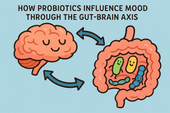
How Probiotics Influence Mood Through the Gut-Brain Axis
Discover how probiotics can do more than support your digestion—they can actually uplift your mood. This article explores the fascinating gut-brain axis and how balancing your gut bacteria through probiotics may help reduce anxiety, improve emotional stability, and support long-term mental well-being. 🌿🧠
-
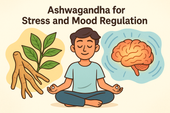
Ashwagandha for Stress and Mood Regulation
Discover how Ashwagandha, the powerful adaptogenic herb 🌿, helps your body manage stress and regulate mood. Learn how it balances cortisol, boosts GABA and serotonin, and supports emotional stability — helping you feel calm, focused, and resilient every day.
-
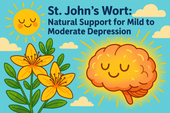
St. John’s Wort: Natural Support for Mild to Moderate Depression
Discover how St. John’s Wort, the “sunshine herb” 🌼, naturally supports mild to moderate depression. Learn how it boosts serotonin, balances mood, and promotes emotional resilience — with research showing its effectiveness compares to antidepressants, but with fewer side effects.
-

Chamomile and Lavender: Herbal Calm for Emotional Fluctuations
Discover how chamomile and lavender bring calm to emotional ups and downs 🌿. Learn how these two soothing herbs balance your nervous system, ease anxiety, and support restful sleep — naturally helping you find peace and emotional stability.
-
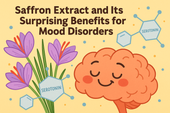
Saffron Extract and Its Surprising Benefits for Mood Disorders
Discover how saffron extract — the golden spice of joy 🌸 — can naturally support mood balance, ease anxiety, and lift mild depression. Learn what science says about its serotonin-boosting power, the ideal dosage, and how this ancient remedy compares to modern antidepressants.
-
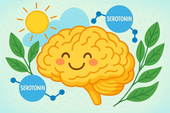
5-HTP and Serotonin: A Natural Path to Lifting Mood
Discover how 5-HTP naturally boosts serotonin 🌞 — the neurotransmitter behind mood, sleep, and emotional balance. Learn how this plant-derived compound supports happiness, reduces anxiety, and improves rest by helping your brain create more serotonin the gentle, natural way.
-
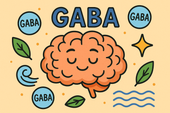
GABA Supplements for Reducing Anxiety and Mood Swings
Discover how GABA supplements can help reduce anxiety and balance mood naturally 🌿. Learn how this calming neurotransmitter works to quiet the mind, ease stress, and improve sleep — plus which nutrients and habits can boost your body’s own GABA production for long-term emotional stability.
-
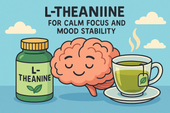
L-Theanine for Calm Focus and Mood Stability
Discover how L-theanine, the calming compound found in green tea 🍵, promotes focus, relaxation, and mood stability. Learn the science behind how it balances neurotransmitters, reduces stress hormones, and enhances clarity — helping you stay centered, calm, and productive without sedation.
-
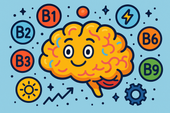
B Vitamins and Brain Chemistry: Supporting Energy and Emotional Balance
Discover how B vitamins power your brain chemistry ⚡. Learn how B6, B9, and B12 support serotonin, dopamine, and energy production — helping boost focus, mood, and emotional balance. From diet to supplements, explore how this vital nutrient group keeps your mind resilient and your energy steady.
-

N-Acetyl Cysteine (NAC) and Mood Disorders: What the Research Says
Learn how N-Acetyl Cysteine (NAC) supports brain health and mood balance 🧠. Discover how this antioxidant helps reduce oxidative stress, regulate glutamate, and improve emotional stability in depression, bipolar disorder, and anxiety — backed by cutting-edge psychiatric research.
-

Supplements for Bipolar Disorder: What May Support Stability
Discover the best supplements for bipolar disorder 🌿 that may support emotional stability and brain health. Learn how nutrients like omega-3s, magnesium, vitamin D, and NAC can help reduce inflammation, balance neurotransmitters, and complement traditional treatment safely.

















































